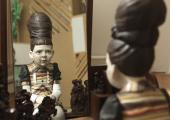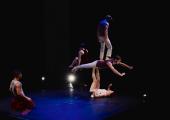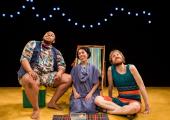Jeremy Hardy, Brighton Festival review - expert raconteur shows political bite

Radio 4 regular's conversational style masks a passionate pin-sharp topicality
Jeremy Hardy is very happy to mock his audience and they love it. One of the biggest laughs of the night is when a punchline refers to us as a collection of “middle class white people”. Being Brighton, he goes further, explaining how tolerant the city is but that everyone’s frustrated as they have no-one to tolerate. Any immigrants, he explains, take one look and head down to Devon “where they have cream teas”. His “demographic”, as he refers to them, are certainly an older crowd, mostly retirement age, probably Radio 4 listeners who’ve heard him on endless quiz shows, but the comedian is full of political pith and vinegar that would appeal to anyone sick of this country’s ongoing political decline.
It’s a show of two parts (with a 20 minute interval), each around half an hour long, and it truly flies by. He’s not a comic who, as far as it’s possible to tell, has a tightly plotted set that comes to a heady peak at its close. He’s much more of a rambler, interspersing thoughts on a wide variety of subjects, from Jeremy Corbyn to English Sunday lunches in the 1970s, with punchy surreal asides, and oddball flights of fancy. Clad in a blue denim shirt and grey-black jeans, with a small greying quiff, he’s a lean and diminutive presence, but has a wry way about him that’s contagious.
He claims, near the start, that he no longer believes politics can be influenced by a comedian, so he’s going to leave that alone, then proceeds not to for nearly two hours. Whether he’s assessing Jeremy Hunt or UKIP’s Paul Nuttall, his thoughts chime with everyone here, it seems, and, of course, he can’t leave Theresa May alone, relentlessly referring to her miserable presence and general inhumanity. I enjoyed the line where he talks about people being bullish about “our country” with regard to asylum seekers when, in fact, it’s all "owned by dukes, pension funds, the Russian mafia and the church”.
It’s not all politics. He talks a lot of his recently deceased parents, their lives and values, in a way that's both touching and playful. Although, in its way, that does eventually turn out to be socio-political too. They become emblems for the arrival of a more caring society at the end of the Second World War. However, he's also a snappy performer of silly routines and voices. At one point he combines the talents of Nicola Sturgeon with those of the pop singer Kelis for a bizarrely brilliant turn, and later on, his bananas send-up of television hospital drama is a highlight of the evening.
For me, another moment that absolutely clicked early on was a ruthless assessment of the modern middle-aged person’s obsession with publicizing their physical exercise regimen on social media. “If you want to go for a run, just go for a run, you don’t have to tell me about it,” he says, exasperatedly. “I can’t stand the camaraderie around fitness.” From that point this expert raconteur had another listener wrapped around his finger, heading into a night whose chattiness and wit masked a lancet-sharp intelligence with precision topical bite.
Overleaf: Clip of Jeremy Hardy being funny at the Whitby Festival last year









